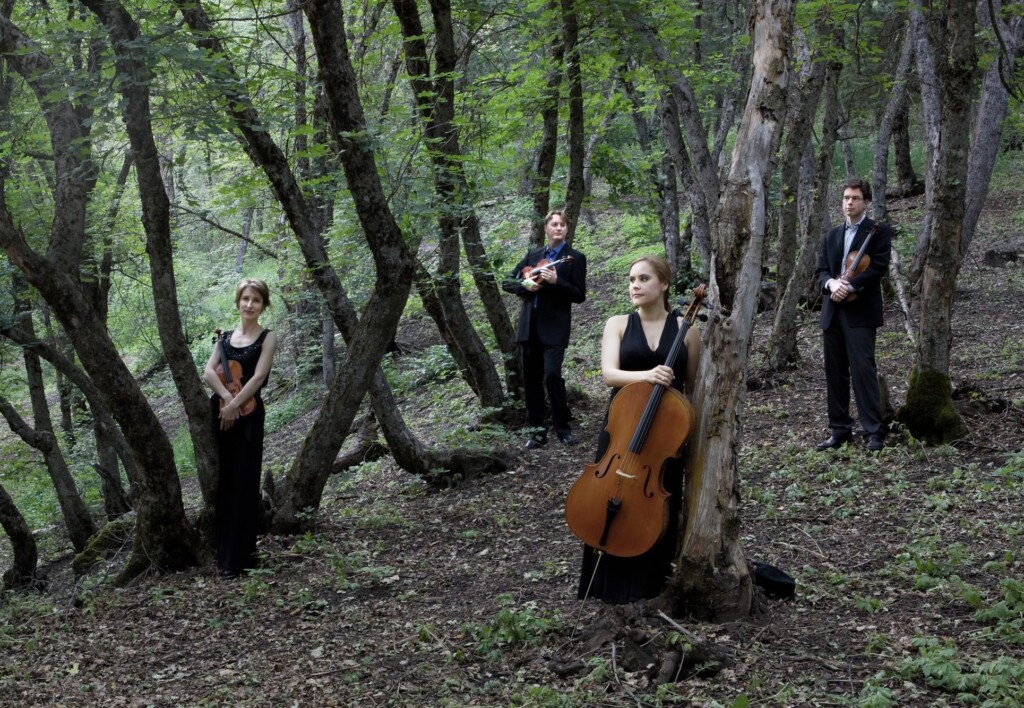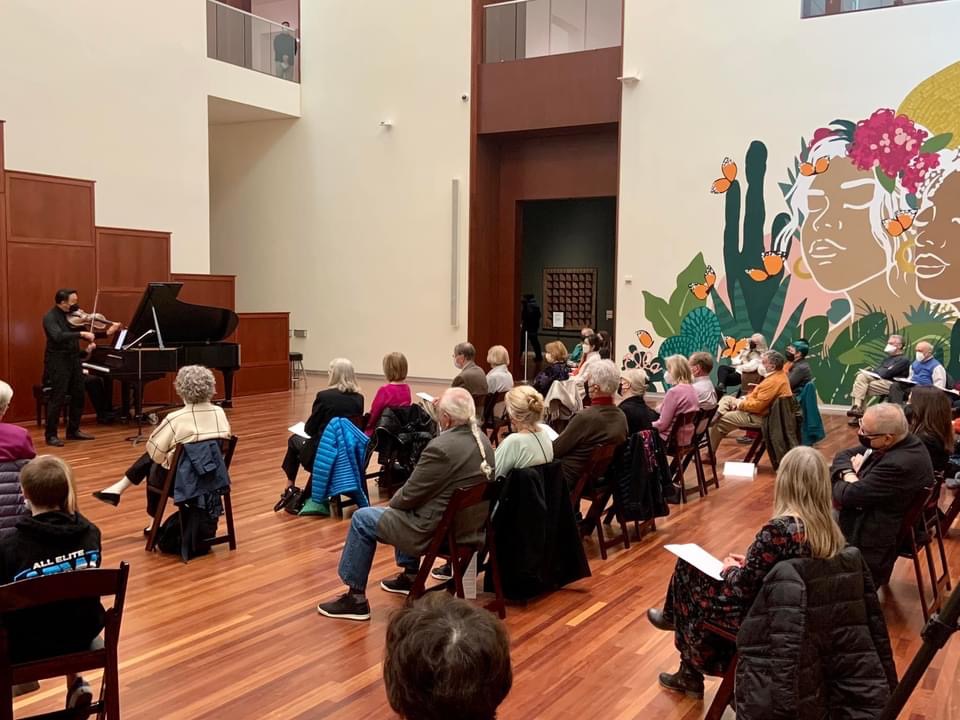A rare all-British NOVA Chamber Music Series concert was an exquisite treat last weekend for the organization’s only Gallery Concert of the current season in the G. W. Anderson Family Great Hall of the Utah Museum of Fine Arts.
The music of Benjamin Britten, John Dowland and Henry Purcell actually fit marvelously in the museum setting, where four exceptional murals by local artists make the space resonate in an unforgettable way. Since the Fry Street Quartet became the series’ music directors, British music has found its way into the repertoire, most particularly works by Britten. Judging by the performance and a solid welcome by audiences, the case for Britten as one of the greatest 20th century composers (and perhaps the best candidate from the period for a permanent spot in the repertoire) was made with impressive results.
Indeed, as the superbly drafted program notes by Chris Myers explain, “Few composers have been as aware of their musical heritage as Benjamin Britten. So as he faced the challenge of creating a distinctly English music for the 20th century, Britten looked, not to the continental classical tradition, but to his own country’s musical past.”
Alternating between the three chamber works of Britten (1913-1976) that were presented were pieces by composers from much older times that brought Myers’ point to stellar clarity — John Dowland (1563-1626) and Henry Purcell (1659-1695).
Britten’s music is bedeviling in its technical complexities, a trait that the composer always managed to achieve with understated effect by luring both musicians and audiences with a crafty sense of ease and simplicity. But, when executed precisely, the rewards are mesmerizing. Trumpeters Travis Peterson, Jeff Luke, and Peter Margulies confidently set the agenda with Britten’s Fanfare for St. Edmundsbury, which was played in the mezzanine overlooking the Great Hall in the museum. The effect of three separate melodic lines written in different keys captivates the ear in a new unfamiliar appreciation that elevates the fanfare from its customary expectations.
The five excerpts of sung Elizabethan verse from Dowland’s The Bookes of Songes or Ayres sound flattering in the generous acoustics of the performing space in the museum. The balance between soprano Julia Gershkoff and lute player Cameron Welke was spot on in every excerpt.
The Dowland connection to Britten’s Lachrymae for viola and piano, the work immediately following the songs, was unmistakable but it was rewarded to those who listened closely. As Myers noted, the piece opens “not with a statement of the song, but by plunging directly into variations that deconstruct the theme, each examining and developing an isolated fragment or element, hints of a tune glimpsed through a musical fog.” Here, Britten’s cosmopolitan and ecumenical genius shines in ethereal wisps of phrases that appear to presage the sort of musical imagery associated with Arvo Pärt or other composers from central and Eastern Europe. Violist John T. Posadas and pianist Jason Hardink (former NOVA music director) gave a profound reading of the work.
The final two works — Purcell’s Fantasia Upon One Note and Britten’s String Quartet No. 2 — were presented without a break. The Purcell Fantasia is an intriguing three-minute piece written in 1680 when the composer was 21. Scored for five instruments, the piece revolves around a middle-register instrument playing a single note throughout the length of the music. In a 1946 recording of the piece with the Zorian Quartet, Britten played the second viola part, which was to sustain the open string pitch throughout the length of the composition. That C major drone also appears in the quartet, which Britten wrote to commemorate the 250th anniversary of Purcell’s death.
Posadas joined the Fry Street Quartet on the Purcell work as the second violist and then slowly walked backstage in the final seconds of the work as he played the last bars of the droning note. This segued immediately into the Britten work. The Fry Street Quartet (Robert Waters and Rebecca McFaul, violins; Bradley Ottesen, viola, and Anne Francis Bayless, cello) just recently added this Britten chamber work to the repertoire and the performance evoked the orchestral feel that encompasses this piece. The work is restless in its emotional journey but the cadenzas are stunning, with special kudos to Bayless. And, as Myers highlights, regarding the finale, “no fewer than 23 explosive C major chords drag the bass line back into full conformity with the home key of the piece.”
Fry Street Quartet has cultivated a distinguished reputation for their performances of the Bartok string quartets but the recent additions of Britten to their repertoire are just as significant. In an earlier season, they performed Britten’s String Quartet No. 3 at a gallery concert in the museum.
NOVA’s season subscription series continues its song theme with the Songs of Play concert at Libby Gardner Hall at The University of Utah (March 13, 3 p.m.). This concert highlights NOVA’s unique juxtaposing programming brand with two bookends being quintets representing composers of entirely different backgrounds: Sergei Prokofiev, a 20th century Russian composer of the Soviet era, and Samuel Coleridge-Taylor, the Anglo-African composer of the late 19th and early 20th centuries. This concert also will feature two world premieres, a new yet untitled work by Stephanie Boyd and Counterplay by Luke Dahn. Boyd, a Michigan native who works in Manhattan, composes melodic music about women’s memoirs and the natural world for symphonic and chamber ensembles. Her portfolio includes commissions from 37 countries. Dahn, who serves on The University of Utah music faculty, also has an extensive international portfolio of commissions and performances of his work. Dahn also is co–founder and co–artistic director of Ensemble Périphérie, which made its Carnegie Hall debut in 2013, and serves on the board for the League of Composers/ISCM in New York.
For more information about tickets and the remainder of the season, see the NOVA Chamber Music Series website.



